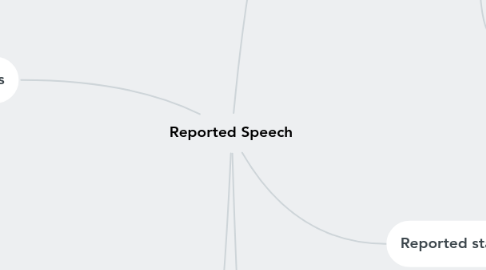
1. Universal Truth Sentences
1.1. An accepted fact
1.1.1. - Three and three make six - London was the biggest city in England.
1.2. Habitual actions
1.2.1. - I wake up at 6:00 o´clock -After dinner I walk 3 km daily
1.3. General Truth sentences
1.3.1. - Honesty is a good value - The earth moves
2. Reported Speech Imperatives
2.1. informed speech imperatives it means that something is of utmost importance or necessity it also means "a command"
2.2. Positive: "to"+verb Do the laundry!
2.3. Negative: "not to" Don't do the laundry!
3. Reported statements
3.1. We present informed statements with "informational verbs", such as "say" or "tell":
3.2. When we use our own words we sometimes change:
3.2.1. pronouns to reflect a different perspective
3.2.2. we may need to change the time or place.
3.2.3. Sometimes we also need to think about the third person singular "s":
3.3. Pronouns need to be changed
3.3.1. For example: Direct speech: He said, "I am sick." Reported speech: He said that he was sick.
3.4. The tense has to go back one tense
3.4.1. tense Reported speech Simple present Simple past Present continuous Past Continuous Simple past Past perfect Present perfect Past perfect am/ is/ are going to was/were going to can/can't could/ couldn't will/ won't would/ wouldn't
4. What is it?
4.1. Reported speech is used to tell what another person has said and to recreate the speech, without using the exact words that the other person used.
4.1.1. More tenses Direct speech Reported speech Past perfect Past perfect Past perfect continuous Past perfect continuous would would could could may might might might should should must had to ought to ought to
5. Questions Reported Speech
5.1. WH QUESTIONS
5.1.1. DS: Mother said to me: "What are you doing? RS: My mother asked me what I was doing
